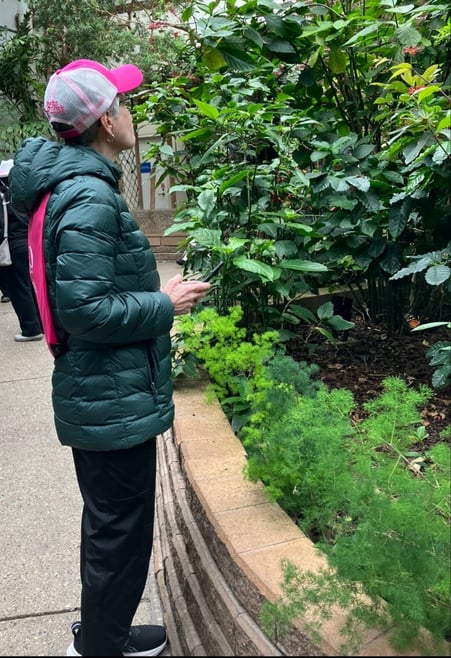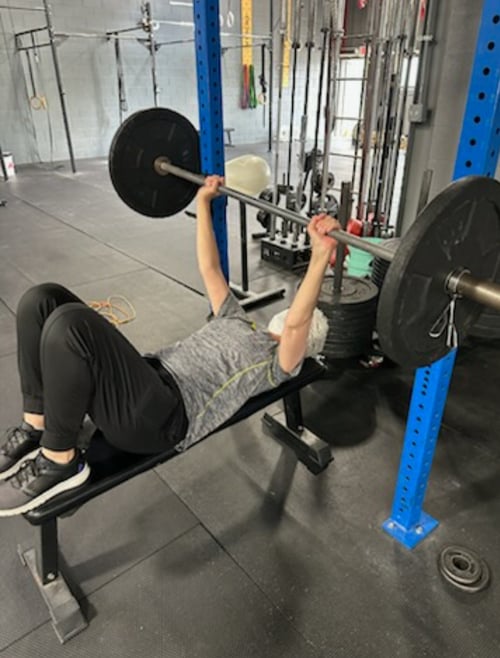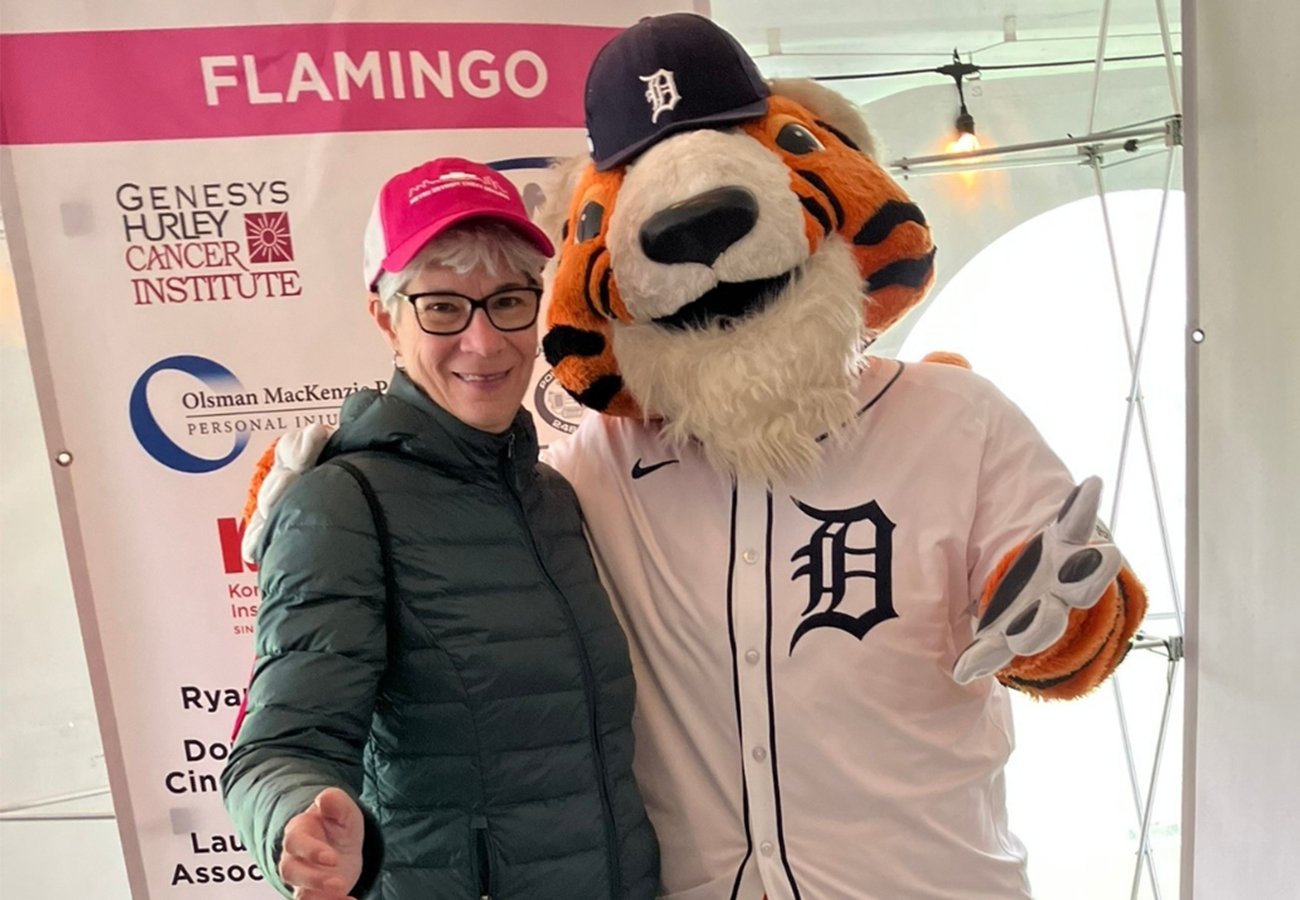Jun 27, 2025
Ellen Kershenbaum has always loved being active. But after being diagnosed with Fuchs dystrophy—a progressive corneal disease—she needed multiple corneal transplants to regain her vision and independence.
From hiking to CrossFit, she’s the kind of person who finds joy in movement and momentum. But in her late 40s, she noticed something was off.
When she traveled, she realized she couldn’t read street signs anymore. Humid days brought pain and fogginess to her eyes. Darkness made driving nearly impossible. Tasks that once came naturally—reading food labels, cooking with precision, attending work meetings—became a challenge.
Eventually, Ellen was diagnosed with Fuchs dystrophy, a progressive disease that causes cells in the cornea to deteriorate and die. Her independence slowly slipped away.
“I had to become more and more dependent upon other people,” she said. “I had to have my computer monitor adjusted. I tried not to go to early morning meetings when it was dark or after dark in the evening, which was difficult for the type of work that I did.”
The gift of sight, three times over: Ellen’s corneal transplant success
In December 2016, Ellen underwent her first cornea transplant. Recovery was difficult and she didn’t receive a second transplant in her other eye until April 2017. The delay caused a disparity in her vision, resulting in months where she couldn’t drive or fully function independently.
But that second transplant brought swift relief.
“Within two weeks I was able to drive, and everything was pretty good,” Ellen said. “That was fantastic.”
Life carried on. But as time passed, Ellen began experiencing foggy vision, discomfort and pain in her right eye. She underwent a procedure in September 2022 called a superficial keratectomy that removes the outer layer of the cornea, hoping it would help. She learned her original transplant was failing when the pain worsened.
“I started to experience extreme pain,” Ellen said. “Really all I could do was lay in bed or lay on the couch. I had another transplant on my right eye in December of 2022, and that wasn't going so well. So, I was scheduled for February and then that would've been my fourth transplant.”
Preparing for a fourth corneal transplant—until everything changed
Despite the new transplant, Ellen’s vision and pain didn’t improve. The cornea refused to attach, and Ellen was in excruciating pain. She couldn’t drive, read or even keep her eyes open without pain.
“I was totally dependent on other people for most things,” she said.
A fourth transplant was scheduled for February 2023. But just a week before surgery, something miraculous happened.
“I started to notice my pain was going away,” Ellen said. “I thought, this is weird, but in a good way. I could see better, I could read print. This is kind of weird.”
While Ellen was in pre-op, she pulled her doctor aside, saying, "I’m not one to believe in miracles, but I think I have a miracle going on.”
And she did: the cornea transplant from December 2022 was finally attached.
“I was so excited,” Ellen said. “They took the IV out and I still had that shower cap on. I was like out the door, and they said, ‘Wait, wait, you still have your surgery cap on!’ I said, ‘I’m going to lunch!’”
Instead of being transplanted, the cornea her doctor had requested was returned to Eversight for research and education—to help others just like her.
“When I was in pre-op and I asked the doctor what was going to happen to the cornea because, I felt bad that here's this cornea waiting, and she reassured me it was going back to Eversight,” Ellen said.
“I was thrilled I didn't need the fourth transplant, and I was thrilled that the tissue was going to be used for research that hopefully can help possibly myself as well as others in the future. That was huge.”
Transplant recovery & everyday joys
Today, Ellen still experiences some vision issues and severe dry eye, but she’s able to drive, walk independently, read, cook and hike again. With new medication and continued treatment, she’s savoring the everyday moments she once lost.
“I've read and heard about stories from other cornea recipients, and they have these huge moments, but mine are the simple everyday things,” she said. “I had to count steps from my bed to the bathroom just to make sure I wasn't going to bash into anything.”
Ellen used to avoid using kitchen knives and potato peelers after cutting herself in the past—an experience that made her give up cooking and depend on others.
“When I went to the grocery store, I was always with somebody. They had to read everything for me,” she said. “So, just to be able to do that on my own is a true blessing.”
As an avid reader, it was heartbreaking when she had to stop enjoying novels for several years. Only recently, just a few weeks ago, was she finally able to pick up a book again.
“It’s the small things you take for granted, but not being able to do them–they really are the big things in life,” she said. “I didn't realize how bad it was because it was a gradual occurrence. So, once I gained my full eyesight back, it was like, wow, it really was that bad.”


Eye donor gratitude & donor family aftercare
Ellen never forgets the people who made her restored vision possible.
“Without the corneas donated to me, I would not have my independence,” she said. “A day does not go by when I don’t think about my donors.”
Ellen attends and supports the Michigan Donor Family Gathering—an event held every year to honor and celebrate eye, organ and tissue donors in Michigan, to connect with donor families and share her gratitude.
“If there is one minute of joy, comfort or connection with other people—anything that helps their grieving process—then it’s well worth it,” she said. “I hope I’m able to do that for years into the future.”
She’s also passionate about donor family aftercare.
“So often things happen in life where people are forgotten,” Ellen said. “Whether it's death or other aspects of life, people just forget or don't want to remember.”
“I think it's important to always remember the donors and their families. It's how it touches me and being 62, I'm not done. I'll probably have to go back for another transplant or two. It's important to me. It's part of my life.”
A mission that matters: Advocating for eye donation
Ellen continues to advocate for eye donation and educate others, often wearing Donate Life pins and Eversight bracelets to spark conversation. She also shares heartfelt appreciation for Eversight’s transparency and kindness.
“There’s so much warmth and kindness from everyone I’ve worked with and interacted with at Eversight,” she said. “I can see why you’re one of the top employers. That shines through to someone like me who volunteers, donates and engages with Eversight throughout the year.”
Ellen’s story is one of resilience, gratitude and unexpected moments. Thanks to the generosity of her cornea donors, their families and the miracle of the gift of sight, Ellen continues to live life fully, one small joy at a time.
Ready to change someone’s life?
Register as an eye, organ and tissue donor and give today.
Interested in receiving periodic news and updates from Eversight? We invite you to sign up to receive our emails.

